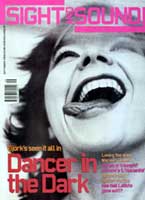Primary navigation

France 1998

Reviewed by Chris Darke
Our synopses give away the plot in full, including surprise twists.
At a Paris railway station, the friends and family of Jean-Baptiste Emmerich, a recently deceased painter, gather to travel to Limoges for his funeral. Among them are François, who listens to taped conversations with the painter recorded at the end of his life, Jean-Marie and Claire, a couple in the throes of divorce, Lucie, a former lover of Emmerich, and Louis, a close friend of François, who's fallen in love with Bruno, a young man who's HIV+. As they head towards Limoges, the mourners watch aghast as the car carrying Jean-Baptiste's coffin is driven recklessly alongside the train by their friend Thierry. During a short break on the journey Claire, an ex-drug addict who's discovered she's pregnant, argues violently with Jean-Marie.
At the Limoges cemetery Jean-Marie meets his father, Lucien, who is Jean-Baptiste's twin brother. Thierry arrives and sneaks off with Jean-Marie to take drugs together. At the graveside, Jean-Marie launches into a vicious tirade against families and declares he will never become a father. Claire is disgusted. The wake takes place at Lucien's family home where the atmosphere soon degenerates into arguments over who was closest to Jean-Baptiste. Claire discovers that a young woman at the wake, Viviane, is in fact Jean-Baptiste's son, Frédéric, who's had a sex change. Later that night, Thierry and Jean-Marie have an argument that ends in violence. The following morning, the mourners leave: François on his own, Claire and Jean-Marie reunited and Louis and Bruno having decided to forge ahead in a relationship.
While being firmly rooted in the present day, Patrice Chéreau's Those Who Love Me Can Take the Train shares the intimate focus and ensemble dynamics of the director's 1994 ballet of bloodletting La Reine Margot. Following an ill-matched group of mourners, travelling from Paris to Limoges for the funeral of a painter, Jean-Baptiste Emmerich, Chéreau breaks his film down into three distinct parts: the journey, the funeral and the wake, which is presided over by Jean-Baptiste's brother Lucien (played by Jean-Louis Trintignant). But where Margot, set in the poisonous, back-stabbing atmosphere of Charles IX's court, was about blue blood gone bad, Those Who Love Me is more prosaic, concentrating on the sundered relationships around the Emmerich family and the competing claims of friends and kin over the memory of the dead painter. This may suggest Chéreau is mining a similar family plot to the ones recently excavated by André Téchiné in Alice et Martin and Olivier Assayas in Late August, Early September, where domestic drama is played out around the death of a loved one. But Chéreau's excursion into this familiar territory has extraordinary vigour about it, so much so that the first third of the film threatens to overwhelm what follows by being almost excessively vivid.
The journey to Limoges is a triumph both of exposition and choreography. Aided by co-screenwriters Danièle Thompson and Pierre Trividic, Chéreau manages to distinguish the individuals within the crowd of mourners that pile onto the train. But he does so through cinematic means that push at the borders of incoherence. Director of photography Éric Gautier's use of handheld 'Scope cinematography gives the feeling of both buffeting movement and swooping detail. The sense of intense physicality, of bodies in antagonistic proximity, conveyed in the extended sequences on the train brings to mind La Reine Margot. But Chéreau really ups the formal ante through his use of sound. Jean-Baptiste's voiceover, reminiscences recorded by his friend François (Pascal Greggory), overlap with the loaded dialogue of the cortège and an insistent, almost pointedly illustrative use of music. At one point, a group of the train-bound mourners watch as Thierry (Roschdy Zem), who's transporting Jean-Baptiste's coffin by road, guns his car to keep up with the speeding train. The welling guitar introduction to Jeff Buckley's 'Last Goodbye' works with the camera as it closes on Thierry's vehicle and drives home a sense of headlong recklessness that counterpoints the song's mellow lyrics. These gusts of music carry like fumes from the smoker's carriage and thicken the film's emotional textures; at any moment it feels like the whole journey might spiral off into hysterical anarchy.
In the subsequent funeral and wake sequences the cast get a chance to steal the film back from their director's hyperactive choreography. And it's some cast: Charles Berling is Jean-Marie, the overwrought, feckless and tempestuous son of Lucien Emmerich; Valéria Bruni-Tedeschi as Claire, his ex-addict wife who's carrying his child, exudes desperation and resolve in equal measure (Bruni-Tedeschi, with her Anna Magnani-like mournful sensuality, was born to play Joan of Arc); Vincent Perez is affecting in drag as Jean-Baptiste's sex-change son; and Trintignant presides over family breakdown with sorrowful, seedy stoicism. Chéreau was recently in London, shooting the film version of Hanif Kureishi Intimacy. It's worth waiting to see if he's able to bring the operatic-kinetic tendencies visible in Those Who Love Me Can Take the Train and La Reine Margot to his adaptation of Kureishi's aptly named novel.